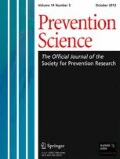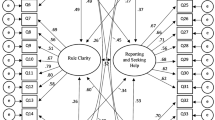Abstract
We examined the impact of the Experience Corps® (EC) program on school climate within Baltimore City public elementary schools. In this program, teams of older adult volunteers were placed in high intensity (>15 h per week), meaningful roles in public elementary schools, to improve the educational outcomes of children as well as the health and well-being of volunteers. During the first year of EC participation, school climate was perceived more favorably among staff and students in EC schools as compared to those in comparison schools. However, with a few notable exceptions, perceived school climate did not differ for staff or students in intervention and comparison schools during the second year of exposure to the EC program. These findings suggest that perceptions of school climate may be altered by introducing a new program into elementary schools; however, research examining how perceptions of school climate are impacted over a longer period is warranted.


Similar content being viewed by others
References
Astor, R. A., Benbenisty, R., & Estrada, J. N. (2009). School violence and theoretically atypical schools: The principal’s centrality in orchestrating safe schools. American Educational Research Journal, 46, 423–461.
Bradshaw, C., Koth, C., Thornton, L., & Leaf, P. (2009). Altering school climate through school-wide positive behavioral interventions and supports: Findings from a group-randomized effectiveness trial. Prevention Science, 10, 100–115.
Brand, S., Felner, R., Shim, M., Seitsinger, A., & Dumas, T. (2003). Middle school improvement and reform: Development of validation of a school-level assessment of climate, cultural pluralism and school safety. Journal of Educational Psychology, 95, 570–588.
Bryk, A. S., Sebring, P. B., Allensworth, E., Luppescu, S., & Easton, J. Q. (2010). Organizing schools for improvement: Lessons from Chicago. Chicago: University of Chicago.
Cohen, A. K., & Syme, S. L. (2013). Education: A missed opportunity for public health intervention. American Journal of Public Health, 103, 997–1001.
Cohen, J., McCabe, E. M., Michelli, N. M., & Pickeral, T. (2009). School climate: Research, policy, teacher education and practice. Teachers College Record, 111, 180–213.
Diggle, P. J., Heagerty, P., Liang, K., & Zeger, S. L. (2002). Analysis of longitudinal data (2nd ed.). New York: Oxford University Press.
Division of Research, Evaluation, Assessment and Accountability (DREAA): Office of Achievement and Accountability. (2008). School year 2006–2007 School Climate Survey data: Students, parents and staff. Baltimore City Public School System.
Division of Research, Evaluation, Assessment and Accountability (DREAA): Office of Achievement and Accountability. (2011). School year 2009–2010 School Climate Survey data: Students, parents and staff. Baltimore City Public School System.
Durlak, J. A., Weissberg, R. P., Dymnicki, A. B., Taylor, R. D., & Schellinger, K. B. (2011). The impact of enhancing students’ social and emotional learning: A meta-analysis of school based universal interventions. Child Development, 82, 405–432.
Fried, L. P., Carlson, M. C., McGill, S., Seeman, T., Xue, Q. L., Frick, K., & Rebok, G. W. (2013). Experience Corps: A dual trial to promote the heath of older adults and children’s academic success. Contemporary Clinical Trials, 30, 1–13.
Glass, T. A., Freedman, M., Carlson, M. C., Hill, J., Frick, K. D., Ialongo, N., & Fried, L. P. (2004). Experience Corps: Design of an intergenerational program to boost social capital and promote the health of an aging society. Journal of Urban Health, 81, 94–105.
Gottfredson, G. D., Gottfredson, D. C., Payne, A. A., & Gottfredson, N. C. (2005). School climate predictors of school disorder: Results from a national study of delinquency prevention in schools. Journal of Research in Crime & Delinquency, 42, 412–444.
Grayson, L., & Alvarez, H. (2008). School climate factors relating to teacher burnout: A mediator model. Teaching and Teacher Education, 24, 1349–1363.
Guin, K. (2004). Chronic teacher turnover in urban elementary schools. Education Policy Analysis Archives, 12. Retrieved [5/24/2012] from http://epaa.asu.edu/epaa/v12n42.
Hamre, B. K., & Pianta, R. C. (2001). Early teacher-child relationships and the trajectory of children’s school outcomes through eighth grade. Child Development, 72, 625–638.
Hoy, W. K., & Hannum, J. W. (1997). Middle school climate: An empirical assessment of organizational health and student achievement. Educational Administration Quarterly, 33, 290–311.
Kuperminc, G. P., Leadbeater, B. J., & Blatt, S. J. (2001). School social climate and individual differences in vulnerability to psychopathology among middle school students. Journal of School Psychology, 39, 141–159.
Loukas, A., & Robinson, S. (2004). Examining the moderating role of perceived school climate in early adolescent adjustment. Journal of Research on Adolescence, 14, 209–233.
MacNeil, A. J., Prater, D. L., & Busch, S. (2009). The effects of school culture and climate on student achievement. International Journal of Leadership in Education, 12, 73–84.
Maslach, C., & Jackson, S. E. (1981). The measurement of experienced burnout. Journal of Occupational Behaviour, 2, 99–113.
Melick, C., Feldman, B., & Wilson, R. (2008). SY07-08 School climate data: Students, parents, and staff. Retrieved from: http://www.baltimorecityschools.org
Mitchell, M. M., Bradshaw, C. P., & Leaf, P. J. (2010). Student and teacher perceptions of school climate: A multilevel exploration of patterns of discrepancy. Journal of School Health, 80, 271–279.
National School Climate Council. (2007). The school climate challenge: Narrowing the gap between school climate research and school climate policy, practice guidelines and teacher education policy. Retrieved from: www.schoolclimate.org/climate/advocacy.php
Nunnally, J. C., & Bernstein, I. H. (1994). Psychometric theory (3rd ed.). New York: McGraw-Hill.
Osher, D., Kendziora, K., Spier, E., & Garibaldi, M. L. (2014). School influences on child and youth development. In Z. Sloboda & H. Petras (Eds.), Advances in prevention science (Defining prevention science, Vol. 1, pp. 151–170). New York: Springer.
Ramsey, C. M. (2014). School climate, older adult characteristics, and fulfillment of school-based volunteer roles in the Baltimore Experience Corps study (Doctoral dissertation). Johns Hopkins University, Baltimore, MD.
Rebok, G. W., Carlson, M. C., Glass, T. A., McGill, S., Hill, J., Wasik, B. A., & Rasmussen, M. D. (2004). Short-term impact of Experience Corps participation on children and schools: Results from a pilot randomized trial. Journal of Urban Health, 81, 79–93.
Rebok, G. W., Tan, E., Xue, Q.-L., Wang, T., & Lu, Q. (2009). Child and school evaluation of the Baltimore Experience Corps ® program: 2007–2008 summary report for the Weinberg Foundation. Baltimore: Johns Hopkins Center on Aging and Health.
Rebok, G. W., Carlson, M. C., Frick, K. D., Giuriceo, K. D., Gruenewald, T. L., McGill, S., & Fried, L. P. (2014). The Experience Corps®: Intergenerational interventions to enhance well-being among retired people. In F. A. Huppert & C. L. Cooper (Eds.), Wellbeing (Interventions and policies to enhance wellbeing, Vol. VI, pp. 307–330). Hoboken: Wiley-Blackwell.
Rosenbaum, P. R., & Rubin, D. B. (1985). Constructing a control group using multivariate matched sampling methods that incorporate the propensity score. American Statistician, 39, 33–38.
Sherblom, S. A., Marshall, J. C., & Sherblom, J. C. (2006). The relationship between school climate and math and reading achievement. Journal of Research in Character Education, 4, 19–31.
Shochet, I. M., Dadds, M. R., Ham, D., & Montague, R. (2006). School connectedness is an underemphasized parameter in adolescent mental health: Results of a community prediction study. Journal of Clinical Child & Adolescent Psychology, 35, 170–179.
Steffgen, G., Recchia, S., & Viechtbauer, W. (2013). The link between school climate and violence in school: A meta-analytic review. Aggression and Violent Behavior, 18, 300–309.
Stewart, E. B. (2008). School structural characteristics, student effort, peer associations, and parental involvement: The influence of school and individual level factors on academic achievement. Education and Urban Society, 40, 179–204.
Sugai, G., & Horner, R. (2006). A promising approach for expanding and sustaining the implementation of school-wide positive behavior support. School Psychology Review, 35, 245–259.
Tan, E. J., McGill, S., Tanner, E. K., Carlson, M. C., Rebok, G. W., Seeman, T. E., & Fried, L. P. (2013). The evolution of an academic-community partnership in the design, implementation, and evaluation of Experience Corps® Baltimore City: A courtship model. The Gerontologist, 54, 314–321.
Thapa, A., Cohen, J., Guffey, S., & Higgins-D’Alessandro, A. (2013). A review of school climate research. Review of Educational Research, 83, 357–385.
Welsh, W. N. (2000). The effects of school climate on school disorder. The ANNALS of the American Academy of Political and Social Science, 567, 88–107.
Wilson, D. (2004). The interface of school climate and school connectedness and relationships with aggression and victimization. Journal of School Health, 74, 293–299.
Zullig, K., Huebner, E. S., & Patton, J. M. (2011). Relationships among school climate domains and school satisfaction. Psychology in the Schools, 48, 133–145.
Acknowledgements
This work was supported by funding from the following sources: the National Institute on Aging (P01 AG027735-03), the Weinberg Foundation, and state and federal AmeriCorps grants. We would also like to thank the Baltimore City Public School System for all of their efforts in helping us acquire and interpret the academic and behavioral outcomes data.
Dr. Erwin J. Tan is with the Corporation for National and Community Service. This manuscript represents work done while Dr. Tan was at the Johns Hopkins Center on Aging and Health. The opinions expressed in this article are those of the authors and do not represent the official position of the Corporation for National and Community Service.
Conflict of Interest
The authors declare that they have no conflict of interest.
Author information
Authors and Affiliations
Corresponding author
Rights and permissions
About this article
Cite this article
Parisi, J.M., Ramsey, C.M., Carlson, M.C. et al. Impact of Experience Corps® Participation on School Climate. Prev Sci 16, 744–753 (2015). https://doi.org/10.1007/s11121-015-0550-2
Published:
Issue Date:
DOI: https://doi.org/10.1007/s11121-015-0550-2




